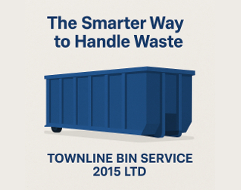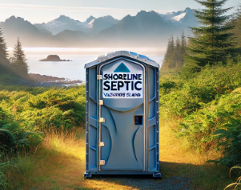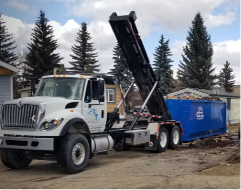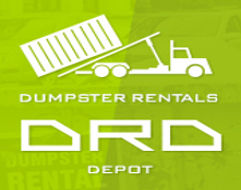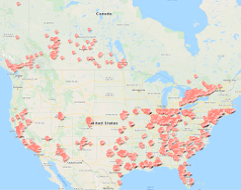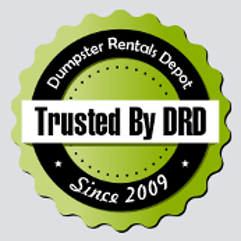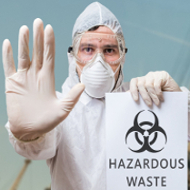Tips for Managing Home Waste

As humans, we cannot help but create garbage. It can be difficult to keep up with taking care of it, especially for a family. But, taking the time be mindful of what you do with your family’s garbage can pay off in spades. Not only can you get rid of garbage more efficiently, but you can also get more organized, save money and have less impact on the environment in the process. Keep reading to learn more about the best ways to handle the garbage you and your family create by putting the well-known slogan “reduce, recycle and reuse” into use.
Reduce Your Garbage
Trying to reduce your garbage can seem like a daunting task, but it can be done. All you need to do is make a few simple changes that will hardly be noticeable.
- Switch out plastic bags for cloth ones whenever possible. It will greatly reduce the amount of waste you bring into your home. Using cloth bags is not limited to grocery stores. Just about every type of store will let you bring in your own bags. Some even have cloth bags you can purchase for a small price. Keep a stash of reusable bags in a convenient place in your home and keep some in your car, too, just in case you walk out the door without some.
- Purchase items that comes in less packaging. Foods that come individually wrapped or items that comes in a box that is wrapped in plastic produce lots of waste. Buying food and other items that have a minimal amount of packaging will noticeably reduce the amount of waste your family produces in no time. Here are some easy ways to reduce the amount of excess packaging you use in your home:
- Buy food in bulk quantities.
- Make dinner instead of eating take-out or microwavable meals.
- Buy dairy items in returnable containers.
- Buy your produce from farmers’ markets.
- Only drink pre-bottled beverages when you have to. Bottled drinks create lots of unnecessary waste. If the water in your area is safe to drink, use tap water instead. If you do not like the way it tastes, consider buying a water filter. You will save a lot of money in the long run, and it is better for the environment. You can further reduce waste by implementing these changes, too:
- Make your own soft drinks, flavored waters or juices like lemonade.
- If you do purchase bottled drinks, go with large containers rather than small ones.
- Reduce the amount of paper your family uses. Only print items from your computer that absolutely need a hard copy. Also, take measures to reduce the amount of paper that gets sent to you in the mail by opting for e-billing statements and other electronic notifications. You can also take measures to reduce the amount of junk mail you receive through the mail.
- Making your own household cleaners can greatly reduce the amount of containers you throw away. Many of the containers purchased cleaners come in are not recyclable, so they only contribute to waste. But, making your own cleaners and storing them in glass containers will save you money and reduce the amount of waste coming from your household. Plus, homemade cleaners are free of chemicals, which is better for your family Some homemade cleaners you can easily make include:
- Laundry detergent.
- Glass cleaner.
- Bathroom cleaner.
- Kitchen cleaner.
- Han soap.
- Shampoo and conditioner.
Reuse and Recycle
Reducing garbage is only one step of managing the waste you and your family produce. You also need to reuse items whenever possible and recycle any items that are eligible. Here are some helpful hints to getting these goals accomplished:
- Donating items that are in good shape but you no longer use like clothing and electronics is a great way to keep them out out landfills and harming the earth. As long as these items still have some life in them, it is best that they go to someone who can use them instead of sitting in a landfill. You can either bring items do a donation center or contact schools, homeless shelters or thrift stores to see what their needs are.
- Reusing durable containers multiple times before they get thrown out or recycled helps to reduce waste. You can also use bottles, boxes and bags for other purposes once their initial use is complete. Some examples include:
- Using paper bags to hold recyclable items.
- Creating book covers/protectors with paper bags.
- Printing on both sides of paper.
- Letting kids draw and color on the back of used paper.
- Use food-grade glass containers to store dry goods and leftovers.
** Please note that plastic containers do have a limited lifespan. Do not use them too many times to store food.
- Check with your municipality and recycle items according to the policies that have been enacted. These policies may also be found on the city’s website for easy access. In general the following items can be recycled:
- Plastic containers numbered 1-7.
- Paper products, including cardboard.
- Glass containers.
- Aluminum cans and foil.
- Trash and hazardous waste needs to be disposed of properly. Some items cannot be recycled or reused. Some of these items can be simply thrown in the trash, but others need to be taken to a hazardous waste facility. Check with your local municipality for rules regarding disposing of the following items:
- Batteries.
- Paint
- TVs, computers and other electronics.
- Light bulbs.
Composting
A less common, but still fantastic, way to reduce the waste your family produces is through compositing. Composting is a procedure by which you use organic material like leaves and vegetable scraps and turn it into an energy source for the soil. It is great addition to any garden or lawn maintenance routine. Here are the steps you need to take to start composting:
- Save your food scraps and yard cuttings instead of throwing them away. Items that can be composted are separated into green items and brown items, depending on how quickly they break down. Some common green items to save for compost include:
- Raw vegetable peelings.
- Coffee grounds.
- Tea bags.
- Grass cuttings.
- Leaves.
- Some common brown items to save for compost include:
- Sticks.
- Branches.
- Paper.
- Cardboard.
- Eggshells.
- Sawdust.
- Create a compost site in a sunny, yet partially shaded, spot in your yard. Ideally it should be placed over dirt or grass. The simplest way to create a site is to simply make a compost pile someplace in your yard. You can also make a compost box that meets the dimensions that suit your needs. Using old pallets is great for this method. You can also buy a pre-made compost bin. You can find one at any home and garden store.
- Decide whether you want a cold or hot compost heap. A cold compost heap requires less effort, but it takes longer to be ready. Conversely, a hot compost heat requires a bit more work, but it will be ready in 6-8 weeks.
- For a cold compost heap, you need to fill your designated area with a few inches of your compost materials. When the bin is full, let it start composting, it can take up to a year to fully do so. You can start taking compost from the bottom as needed.
- For a hot compost heat, you need to mix your compost materials well and fill your bin to the top (or make a large pile). Give it time to warm up. When it is hot-to-the- touch, stir it and let it cool down. Repeat this process a few weeks later. Keep repeating every few weeks until it stops heating up after stirring. Then, let it rest to finish composting.
- Maintain your compost site by adding more brown items to slow down the process if it rotting or getting slimy. Add green items or water to speed it up if it is dry. Periodically turn the pile, particularly if it smells like ammonia.
- The compost will turn to a rich brown or black color and smell earthy when it is ready to use. It can take up to two months to do so. Fertilize your gardens with it or spread it around your lawn. It will give a nutritious boost to wherever you put it.
Reducing the waste produced by your family does not need to be a monumental task. Making a few small changes can produce noteworthy results. All you need to do is make the effort to get started. Once you start implementing changes, you will notice they will quickly become good habits that you and your family will enjoy doing, and the earth will appreciate.
- Published: 2018-07-21T23:36:25-07:00
- Author: Laura Schmidt, Dumpster Rentals Customer Supp
